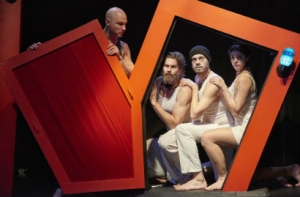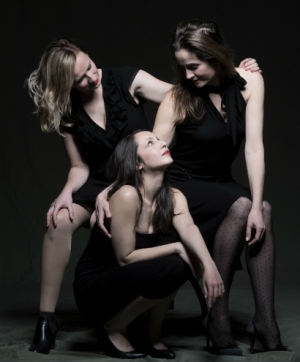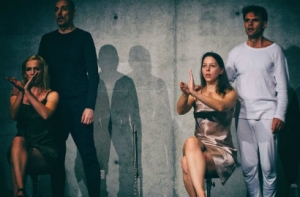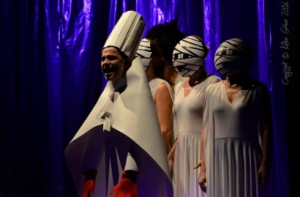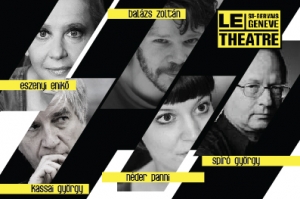Éri Ildikó
Attila Bartis'Directing by National Theatre, Tompa Miklós Company, Tărgu-Mureş
As part of Maladype’s Crossroads program series, the performance Directing by National Theatre, Tompa Miklós Company, Tărgu-Mureş is shown at the Ódry Stage (Padlás/Attic) of the University of Theatre And Film Arts on June 13. Maladype launched its Crossroads series in 2011 with the aim to present artistic trends, theaters, and workshops that strengthen cultural innovation, linguistic diversity, and networking among audiences between our countries. As part of the series, Maladype Theatre hosted, among others, Teatr Baza, Theatro Potlach, Mini Teater, adn Teatrul Act.
About the play:
Secrets are present in all our lives. They circle around us: their echo arises from the walls and the image from the mirror. We sometimes withhold our secrets because of love, other times, because of workplace duties or simply we just do not say anything voluntarily. In our opinion. But this is our own truth. Only the instinct of survival encourages us to pretend that we care about the other ones truth. In fact we are all actors. Our walk in life is a Möbius strip, which always turns in such a way, that we do not fall. In the meantime, due to some miracle our two dimensional reality shapes into a three dimensional stage.
Bartis Attila’s DIRECTING performance is a double premiere: the premiere of the text and it is also the first direction of the author born in Târgu-Mureș.
Writer and director: Attila Bartis
Cast:
János: András Korpos
Olga: Ildikó P. Béres
Lili: Noémi Kádár
Women: Bora Kiss
Sándor: László Kilyén
Péter: László Zsolt Barha
Prpperty man: Ernő Galló
Paramedics: Szabolcs Csíki, Balázs Varga
Set and Costum designer: Erika Márton
Assistant od director: Kata Kölcze
Stage manager: György Vajda
Prompter: Katalin Ferenczi-Tóth
Performance date: 13 June, 2017, 7 pm, University of Film and Thatre Arts, Ódry Stage (Padlás/Attic), Budapest
Zoltán Balázs’s direction from Chicago in Budapest
The play by Matei Visniec premiered in Chicago at Trap Door Theatre company in March 2016, directed by Maladype artistic director Zoltán Balázs. The artistic director of Maladype Theatre is visiting the Windy City upon the invitation of the American workshop's founding director, Beata Pilch. After the debut, the performance received one of the most notable recognitions of American critics, a nomination for JEFF Awards, opening the door to many more performances. At the end of the season, the play did received the JEFF Awards for Original Music. The unanimous public and professional success encouraged the company to consider a multi-station European tour already last year, and they eventually begain their fundraising campaing in 2017. The company arrives in Budapest with such history on 8th of in June as a guest of Maladype and the play’s director; it then will also be showcased at the SIBIU International Theatre Festival as well as Baia Mare, Brasov and Constanta.
Background:
The relations between Maladype and the US theatrical life became closer during the Hungarian Showcase of Spring 2013 where Zoltán Balázs's direction of King Ubu earned a major success. The smashing performance was followed by an American tour in 2014: the company celebrated the 100th anniversary of King Ubu at Touchstone Theatre in Bethlehem, PA, while the also “globe-trotting” EggsHell was staged at Trap Door Theatre in Chicago.
The director met the Romanian-born playwright, who now lives in France, in 2011 at the SIBFEST International Theatre Festival where Maladype performed Büchner's Leonce and Lena, a play with scenes of multiple variations. During the Matei Vișniec-days organized at the Maladype Base on Mikszáth Square in December 2013, the world-renowned artist traveled to Budapest to meet with Hungarian audiences and to see The Story of The Panda Bears Told By a Saxophonist Who Has a Girlfriend in Frankfurt performed by Maladype actors inspired by works of fine art. The idea of staging the playwright's visionary absurdist play Dada Cabaret penned on the centenary of Dadaism in international collaboration in the 100th year of the movement was born during this visit. Co-produced with Gábriel Gábor Farkas and his orchestra, the play is set to have its premiere in Fall 2016, featuring the author himself in many of the scenes.
About the play:
The young Soviet writer Yuri Petrovsky receives the State Prize, directly from Glorious Comrade Stalin himself, for his short stories on building socialism. The Writers' Union picks him out for a special task: they mandate him to give ideological training to the insane. So, he explains the story of communism through a series of short narratives to the patients of a mental institution. His commanders' instructions were: “Use all of your talent and patriotism so that our mentally ill can also feed on the hope that the Great October Socialist Revolution kindled in the hearts of workers of the world...".
About Trap Door Theatre:
Beata Pilch's main mission is to present contemporary European works. Her theater is characterized by the combination of old traditions and modern tools to illustrate the absurdities in today's modern society. The theater company established its permanent home in Chicago in 1994, where American audiences have since enjoyed more than seventy of their performances.
Writer: Matei Vișniec
Translation: Jeremy Lawrence, Catherine Popesco
Director: Balázs Zoltán
Set Desinger: Aaron O'Neill
Costume Designer: Rachel Sypniewski
Music Composer: Danny Rockett
Dramaturg: Milan Pribisic
Makeup Desinger: Zsófia Ötvös
Lighting: Richard Norwood
Assistans of director: Emily Lotspeich, Gary Damico
CAST:
Beata Pilch
Nicole Wiesner
Simina Contras
Dennis Bisto
Michael Garvey
Pavi Proczko
The play is performed in English with Hungarian subtitles.
Reviews:
„No wonder this production, the company’s third Vișniec offering performed by mostly Trap Door regulars, fires on all cylinders for 75 engrossing minutes. Director Zoltán Balázs’s angular, stylized staging is hilarious, perplexing, and harrowing—often all at the same time.”
Justin Hayford, The Chicago Reader
“Thankfully the best part of Trap Door’s great Fairytale Lives of Russian Girls, Simina Contras, remains an absolutely mesmerizing stage presence, even when it’s only her disembodied voice calling out bets on the patients’ window-watching game. I would go to any show advertising her participation. Similarly, Pilch is magnetically maniacal in multiple roles, the director of the loony bin turned full on loon. Despite the flaws, Director Zoltán Balázs creates extremely spellbinding vignettes in what amounts to a sort of slow-motion work of contemporary movement art. Aaron O’Neill’s simple set of cascading doors provides a perfect ethereal counterpart for the insanity.“
Clint May, Chicago Theater Beat
„Balázs has developed a physical acting method that can build and communicate a story without words. It is a beautiful thing to watch.”
Christopher Kidder-Mostrom, Theatre by Numbers
More links to reviews of the performance:
http://chicagotheaterbeat.com/2016/03/22/how-to-explain-communism-to-mental-patients-review-trap-door-theatre/
http://theatre1234.com/?p=1804
http://www.newcitystage.com/2016/04/13/review-how-to-explain-the-history-of-communism-to-mental-patientstrap-door-theatre
Three Sisters
The performance is honoring the memory of Judit Gombár set and costume designer.
Translated by: Dezső Kosztolányi
Director: Zoltán Balázs
After its well-received Platonov debuted in 2010, the theater workshop known for its innovative approach launches a new attack against theater traditions by adapting another Chekhov-play. As the latest addition to Maladype’s performances of playful experimentation with variability (Leonce and Lena, King Ubu, Platonov, Egg(s)hell, and Exercises in Style), Three Sisters also counts on the creative mind of the audience: by breaking down the dramatic text into images, Maladype’s actors perform the individual scenes through the various styles of Hungarian and foreign painters and artists.
Built on the metaphor of “painting as the journey of discovery,” the directorial concept provides a distinctive theater experience by painting a ‘picture-play’ in front of the audience and ‘drawing the phases’ of the characters’ mental processes. Stretched between tradition and modernity, the sensual story of the Prozorov siblings joins the dominant themes and concepts of the eras and styles of painting with rich meaning: the magical and omnipotent dreams, the melancholy and loneliness, the new portrayal and ideals of the human being, the body as medium, life as danse macabre, feeling and ecstasy, painting as a dramatic action, the gap between life and art, nature, light, movement, and technology.
The director's concept boldly plays with the picturesque transformations of the characters in time and space. With its refined and diverse visual world, the performance integrates a broad palette of emblematic artists from significant art periods (Botticelli, van Eyck, Bosch, Da Vinci, Caravaggio, Rembrandt, Munkácsy, Lautrec, Renoir, Csontvary, van Gogh, Picasso, Dalí, Magritte, Vasarely, Warhol, Banksy) into the framework of Chekhovian composition. Art-lovers and theater enthusiasts can equally enjoy the exploration of the specific dramaturgy of reverse metamorphosis ̶ from the casual through the abstract to concrete.

Cast:
Andrei Sergeyevich Prozorov: Zsigmond Bödők
Natalia Ivanovna, AndreI’s bride at the start, later his wife: Erika Tankó
Olga: Ágota Szilágyi
Masha: Kata Huszárik
Irina: Kamilla Fátyol
Fyodor Ilych Kulygin, Latin teacher at the high school, Masha's husband: Zoltán Lendváczky
Alexandr Ignatyevich Vershinin, Lieutenant colonel commanding the artillery battery: Zsolt Páll
Nikolaj Lvovich Tuzenbach, baron, lieutenant in the army: Zsigmond Bödők
Szolyony Vassyily Vasilyevich, captain: Zoltán Lendváczky
Ivan Romanich Chebutykin, army doctor: Zsolt Páll
Ferapont, door-keeper at the local council offices: Lóránd Bartha
Anfisa, elderly family retainer and former nurse: Lóránd Bartha
Creators:
Set Design: Zoltán Balázs
Scenery: Ágnes Czirják
Costum Design: Mari Benedek
Production manager: Katalin Balázs Katalin, Ildikó Éri
Opening night: 8 April 2017, 7 pm, Maladype Base
CHRONOLOGICAL ORDER OF PAINTERS WHO INSPIRED THE SCENES OF THE PERFORMANCE:
I. ACT:
AndreI Rubljov
Sandro Botticelli
Domenico Ghirlandaio
Hieronymus Bosch
Tiziano Vecellio
Giuseppe Archimboldo
Raffaello Sanzio
Matthias Grünewald
Jacopo Tintoretto
Pieter Brueghel
Jan Van Eyck
Paolo Veronese
Hans von Aachen
Leonardo da Vinci
El Greco
Michelangelo Amerighi da Caravaggio
Rembrandt Harmenszoon van Rijn
Thomas Gainsborough
Jean-Antoine Watteau
Jan Vermeer van Delft
Peter Paul Rubens
Diego Rodriguez de Silva y Velázquez
Eugéne Delacroix
William Blake / Francisco José de Goya Lucientes
Jean-François Millet
Katsushika Hokusai
II. ACT:
William Turner
Pál Szinyei Merse
Henri Rousseau
Henri de Toulouse-Lautrec
Tivadar Csontváry Kosztka / Paul Cezanne
Pierre-Auguste Renoir
Louis Degas
Paul Gouguin
Gustave Klimt
Vincent Van Gogh / Henri Matisse
Emil Nolde
Edward Munch
Pablo Picasso
Marc Chagall
Kazimir Severinovich Malevich / László Moholy-Nagy
Natalia Sergeevna Goncharova / Egon Schiele / Francis Bacon
Pieter Cornelis Mondriaan
Wilhelm Heinrich Otto Dix / Tamara de Lempicka
Giorgio de Chirico / Salvador Dali
René François Ghislain Magritte
Remedios Varo / Frida Kahlo
Edward Hopper
Fernando Botero / Andy Warhol / Victor Vasarely
Jackson Pollock / El Kazovszkij / László Fehér
Simon Hantai / Lili Országh / Banksy
Zoltán Balázs directing a ’pictorial’ Three Sisters
The rehearsals of A.P. Chekhov's Three Sisters have begun at Maladype Base in Budapest. Zoltán Balázs’s visionary direction will be presented on Saturday, 8 April, at 7 pm at Maladype Base in Mikszáth Kálmán Square.
The performance is honoring the memory of Judit Gombár set and costume designer.
After its well-received Platonov debuted in 2010, the theater workshop known for its innovative approach launches a new attack against theater traditions by adapting another Chekhov-play. As the latest addition to Maladype’s performances of playful experimentation with variability (Leonce and Lena, King Ubu, Platonov, Egg(s)hell, and Exercises in Style), Three Sisters also counts on the creative mind of the audience: by breaking down the dramatic text into images, Maladype’s actors perform the individual scenes through the various styles of Hungarian and foreign painters and artists.
Built on the metaphor of “painting as the journey of discovery,” the directorial concept provides a distinctive theater experience by painting a ‘picture-play’ in front of the audience and ‘drawing the phases’ of the characters’ mental processes. Stretched between tradition and modernity, the sensual story of the Prozorov siblings joins the dominant themes and concepts of the eras and styles of painting with rich meaning: the magical and omnipotent dreams, the melancholy and loneliness, the new portrayal and ideals of the human being, the body as medium, life as danse macabre, feeling and ecstasy, painting as a dramatic action, the gap between life and art, nature, light, movement, and technology.
The director's concept boldly plays with the picturesque transformations of the characters in time and space. With its refined and diverse visual world, the performance integrates a broad palette of emblematic artists from significant art periods (Botticelli, van Eyck, Bosch, Da Vinci, Caravaggio, Rembrandt, Munkácsy, Lautrec, Renoir, Csontvary, van Gogh, Picasso, Dalí, Magritte, Vasarely, Warhol, Banksy) into the framework of Chekhovian composition.
Art-lovers and theater enthusiasts can equally enjoy the exploration of the specific dramaturgy of reverse metamorphosis ̶ from the casual through the abstract to concrete.
A.P. Chekhov: THREE SISTERS
Translation: Dezső Kosztolányi
Director: Zoltán Balázs
Performers:
Andrei Sergeyevich Prozorov: Zsigmond Bödők
Natalia Ivanovna, AndreI’s bride at the start, later his wife: Erika Tankó
Olga: Ágota Szilágyi
Masha: Kata Huszárik
Irina: Kamilla Fátyol
Fyodor Ilych Kulygin, Latin teacher at the high school, Masha's husband: Zoltán Lendváczky
Alexandr Ignatyevich Vershinin, Lieutenant colonel commanding the artillery battery: Zsolt Páll
Nikolaj Lvovich Tuzenbach, baron, lieutenant in the army: Zsigmond Bödők
Szolyony Vassyily Vasilyevich, captain: Zoltán Lendváczky
Ivan Romanich Chebutykin, army doctor – Zsolt Páll
Ferapont, door-keeper at the local council offices – Lóránd Bartha
Anfisa, elderly family retainer and former nurse – Lóránd Bartha
Creators:
Set Design: Zoltán Balázs
Scenery: Ágnes Czirják
Costum Design: Mari Benedek
Production manager: Katalin Balázs Katalin, Ildikó Éri
Opening night: 8 April 2017, 7 pm, Maladype Base
Irina Wolf: A lively tribute to the Dada Esprit
DADA CABARET by Matei Vişniec
Director and set designer: Zoltán Balázs
Scenography Ágnes Czirják. Costumes Mari Benedek. Dramaturgy Daniela Magiaru. Choreography András Szőllösi. Musical director Gábor Gábriel Farkas. Chorus director Péter Csák. Orchestra Péter Csák, Attila Földesi, Péter Bubu Farkas, Mihály Bazsinka, Zsolt Bér. With Gábor Gábriel Farkas, Zsigmond Bödők, Ágota Szilágyi, Erika Tankó, Erzsébet Kútvölgyi, Kata Huszárik.
Matei Vişniec's play Dada Cabaret is a poetic and, at the same time, critical tribute paid to the avant-garde art movement of the early 20th century. Tristan Tzara, a founding member of Dadaism, is subjected to extensive interrogation about the origin of the word Dada with the enquirer being... Mr. Dada himself. In a sequence of absurd and hilarious scenes, Vişniec captures very well the chaotic aspect of the movement itself as well as of the historical time period in which it was conceived, as the aesthetic revolution which emerged at Zürich's Cabaret Voltaire overlapped with the First World War and the Bolshevik Uprising (the latter giving birth to the deadliest ideology in history – Communism).
The author leaves complete freedom to the director to rearrange the scenes according to his own “Dadaist” views. Thus, the show co-produced by Budapest
Maladype Theatre founder Zoltán Balász and Farkas Gábor Gábriel orchestra – performing live on stage – is a fascinating medley of music, dance and theatre. The six-member ensemble cast delivers an exceptional performance. Following Balász's singular training technique structured on self-examination, the actors sing, dance and act in Hungarian, English, French, German, Romanian, Russian and Japanese. Improvisation scenes and interaction with the public are merged in the director's visionary and imaginative staging. Extremely simple, but wonderfully effective costumes, as well as the song selection by Farkas Gábor Gábriel (who also plays Mr. Dada) offer a vivid reflection of the times of the early 20th century. Still, the performance involves more than entertainment, as the figure of Lenin, who has frequented Cabaret Voltaire a few times without understanding it at all, gives an in-depth look at the acrimonious history. The actor's collective energy explodes on the stage, mirroring a chaotic world. Scenes performed with rigorous precision, yet playfully, mark in a very convincing way the 100-year anniversary of Dadaism celebrated in 2016.
Irina Wolf - 2017.
Great Sound in the Rush in Geneva
After a guest performance at the Musik Theater Tage Wien Festival in Vienna, the critically acclaimed and popular play, Great Sound in the Rush - realized in the coproduction of Maladype Theatre and Qaartsiluni Ensemble - travels abroad again and is hosted by Théatre Saint-Gervais, Geneva on February 10. During a discussion prior to the performance, the audience can meet with Maladype Theatre’s creative team.
10 February, 8 pm, Théatre Saint-Gervais, Geneva
"The happenings are so delightfully diverse, unexpected, adolescent, inspired, erotic, comical, human, surprising that it is entirely hopeless to illustrate it orally in their concreteness."
János Malina: Traditions and Change, 2015.
Reviews of Dada Cabaret
"(...) Well-structured in its dramaturgy, the play enchants its audiences with surreal inserts and funny elements. Thus, it supports complete transformation, allowing everyone to feel as if they entered into another world.”
Dalma Peregi, The Rise and Fall of Dadaism in Two Hours (excerpt9, Súgópéldány, 2016.
"The pursuit of novelty, the consciously executed, unconventional experimentation are familiar trademarks of Maladype Theater. In their latest performance, Dada Cabaret, company head and director Zoltán Balázs feeds secret ingredients with precision as a true chef (...)."
"(...) Zoltán Balázs plays with the various possibilities offered by the genre with ease. While each moment brings entertainment, the play also holds a mirror to society’s sore times. However, during the cabaret, all is good, nothing really hurts; the uncomfortable questions only arise after the performance: have we really become friends with Lenin? Are we his partners in dying? How many cataclysms will we have to take part in from the safety of the whorehouse-revelry?”
Emőke Sárosi, Dada-soup from Maladype’s Kitche (excerpt) Kútszélistílus, 2016.
“The performance is dense, complex, and rich in detail. Zoltán Balázs selected components of the play with his characteristic awareness of being a manager-director. He paired the intellectual text with the stunning stage and musical performer, Gábriel Gábor Farkas and his orchestra; Zsigmond Bödők’s (Tristan Tzara) light and sweeping energy; the female choir’s three character actresses (Ágota Szilágyi, Erika Tankó, Kata Huszárik); Erzsébet “Lenin” Kútvölgyi as a metaphysical counterweight on stage; and a little bit of Brechtism. And he doesn’t want to say anything or send a message with any of this – however, as opposed to the self-definition suggested by the play, this is not a Dadaist work: it wants to affect and does so in the process.”
Máriusz Takács, Dada of the Future (excerpt), kultifilter, 2016.
“Zoltán Balázs makes a kind of theater I also believe in strongly: a theater that lives in the today. This is possible because he takes a road of both research and authenticity. There’s no surplus, no formality, nothing that would not be found in our thoughts and ponderings woven for a long time. It is a special encounter of elements that unite in elegance and harmony. I am mesmerized by the naturalness of movements, the originality of ideas and how these are put into practice, the sharpness of observation. Walking along these simple guidelines, we get to a particularly complex world with goal-oriented and explored depths. A road that gets constantly reinterpreted and one that is constantly on the search without compromising healthy standards. With Maladype, one might experience a theater that you want to see over and over again. It is a full and complete experience and once you were a part of it, then it is difficult to desire anything else. Once you breathe fresh air, it is hard to breathe in the smog.”
Daniela Magiaru, Interview (excerpt), műút, 2016.
Reviews of Dada Cabaret
"(...) Well-structured in its dramaturgy, the play enchants its audiences with surreal inserts and funny elements. Thus, it supports complete transformation, allowing everyone to feel as if they entered into another world.”
Dalma Peregi, The Rise and Fall of Dadaism in Two Hours (excerpt9, Súgópéldány, 2016.
"The pursuit of novelty, the consciously executed, unconventional experimentation are familiar trademarks of Maladype Theater. In their latest performance, Dada Cabaret, company head and director Zoltán Balázs feeds secret ingredients with precision as a true chef (...)."
"(...) Zoltán Balázs plays with the various possibilities offered by the genre with ease. While each moment brings entertainment, the play also holds a mirror to society’s sore times. However, during the cabaret, all is good, nothing really hurts; the uncomfortable questions only arise after the performance: have we really become friends with Lenin? Are we his partners in dying? How many cataclysms will we have to take part in from the safety of the whorehouse-revelry?”
Emőke Sárosi, Dada-soup from Maladype’s Kitche (excerpt) Kútszélistílus, 2016.
“The performance is dense, complex, and rich in detail. Zoltán Balázs selected components of the play with his characteristic awareness of being a manager-director. He paired the intellectual text with the stunning stage and musical performer, Gábriel Gábor Farkas and his orchestra; Zsigmond Bödők’s (Tristan Tzara) light and sweeping energy; the female choir’s three character actresses (Ágota Szilágyi, Erika Tankó, Kata Huszárik); Erzsébet “Lenin” Kútvölgyi as a metaphysical counterweight on stage; and a little bit of Brechtism. And he doesn’t want to say anything or send a message with any of this – however, as opposed to the self-definition suggested by the play, this is not a Dadaist work: it wants to affect and does so in the process.”
Máriusz Takács, Dada of the Future (excerpt), kultifilter, 2016.
“Zoltán Balázs makes a kind of theater I also believe in strongly: a theater that lives in the today. This is possible because he takes a road of both research and authenticity. There’s no surplus, no formality, nothing that would not be found in our thoughts and ponderings woven for a long time. It is a special encounter of elements that unite in elegance and harmony. I am mesmerized by the naturalness of movements, the originality of ideas and how these are put into practice, the sharpness of observation. Walking along these simple guidelines, we get to a particularly complex world with goal-oriented and explored depths. A road that gets constantly reinterpreted and one that is constantly on the search without compromising healthy standards. With Maladype, one might experience a theater that you want to see over and over again. It is a full and complete experience and once you were a part of it, then it is difficult to desire anything else. Once you breathe fresh air, it is hard to breathe in the smog.”
Daniela Magiaru, Interview (excerpt), műút, 2016.
ICI C’EST AILLEURS Festival in Geneva
ICI C’EST AILLEURS Festival in Geneva
On 12th of October in Geneva within the “ICI C’EST AILLEURS” Festival in the Théatre Saint-Gervais Zoltán Balázs talks about the ambition of contemporary theatre and the role of new texts in Hungarian theatre medium, together with Enikő Eszenyi (actress, director, the leader of Vígszínház), Panni Néder (director) and György Spiró (writer).
Moderator: György Karsai (classical-philosopher, arts-historia
More information:
http://www.saintgervais.ch/programme/detail/dernieres-nouvelles-de-hongrie
Ágnes Bakk: Movie Talent Show in 66 Episodes
"The performance is characterized by an incredible, almost undetectable variety as Raymond Queneau’s Exercises in Style presents a single story in 99 ways. However, while Queneau (and Róbert Bognár, his translator to Hungarian) was brilliant in writing the same story in 99 different styles, Maladype’s company presented it in the style of 66 different movies. They reduced the number because they realized that the Hungarian audience, especially in the limited space available, can only handle as much without too much distress. And let me note: the house was 120% full."
Ágnes Bakk: Movie Talent Show in 66 Episodes (excerpt), 2015.

